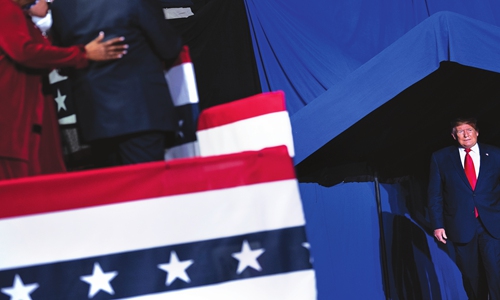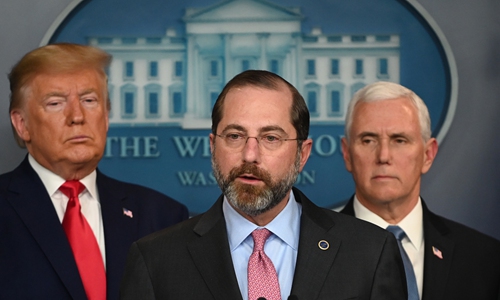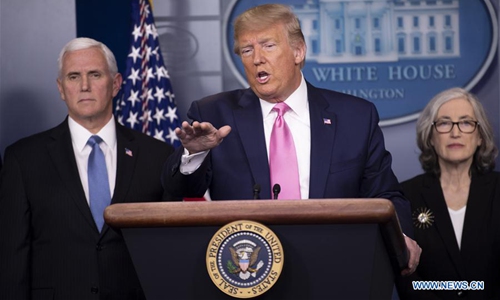HOME >> CHINA
Questions raised over US preparedness in confronting epidemic
By GT staff reporters Source:Global Times Published: 2020/3/3 23:23:41 Last Updated: 2020/3/3 23:48:50

US President Donald Trump arrives to speak at a rally at Bojangles Coliseum on Tuesday, in Charlotte, North Carolina. The US has so far reported 100 cases nationwide and at least six deaths. Photo: AFP
After the US media intensively covered the ongoing coronavirus epidemic in China by harshly criticizing Chinese authorities' response to the unprecedented health crisis in its early stages, it's now worth noting how the Trump administration responds to the epidemic with growing concerns over actual numbers of infections, flawed testing and the slow release of information. Some of those problems could have been avoided if lessons were drawn from China.Now, it has officially become a test of the US political system and its capacity for governance as worldwide infections have exceeded 90,000.
The deadly disease, officially known as novel coronavirus pneumonia (COVID-19), has now spread to every continent except Antarctica. Tedros Adhanom Ghebreyesus, director-general of the World Health Organization, described the world as in "unchartered territory," and "has never before seen a respiratory pathogen that is capable of community transmission like this."
In the US, officials in Seattle, Washington state where the first death was reported, documented that at least four more patients have died from COVID-19, bringing the total death toll to at least six, local media reported on Monday. Unlike China where testing kits have been widely distributed - a necessary step in ensuring proper testing and mass screenings in order to disclose factual numbers of infection - the US has so far reported 100 cases nationwide but with even a higher mortality rate than that in China.
In contrary to local authorities in Central China's Hubei Province, where the epicenter Wuhan is located, which rounded up all confirmed and suspected patients and strictly implemented quarantine measures in curbing viral spread, the US federal government and health commission have not fully implemented mass screening and may have skipped the screening of milder cases, which will hinder the public from understanding the real situation of the outbreak in the US.

Health and Human Services Secretary Alex Azar (center) speaks during a press conference on the COVID-19 outbreak as US President Donald Trump (left) and US Vice President Mike Pence look on at the White House in Washington, DC on Sunday. Photo: AFP
Test of governance
Though US officials including President Donald Trump and Vice President Mike Pence, who is now overseeing the US federal government's response to the outbreak, have been reassuring the public that the risk of a widespread outbreak is low and things will "probably be fine," more medical experts, frontline doctors and other officials raised questions over information transparency in the US and the country's preparation for more outbreaks in the coming weeks.
As it is considered that actual numbers of infections at early stages of the outbreak may not be reflected in reports issued by local health authorities due to delayed responses and lack of mass screening, the US authorities are urged not to play down the seriousness of the outbreak and be prepared for spikes in infection numbers.
Particularly, when veteran medical experts and doctors recently lamented that there are no rapid diagnostic tests available, and some forecast there's going to be hundreds of infections by the middle of the week and thousands in the next, because "this is a testing issue," as Matt McCarthy, an infectious disease physician, told the CNBC in an interview on Monday.
"Early numbers might not be accurate due to the method of response, which occurred in a similar way in the early stages of the outbreak in China," said Zhou Zijun, a public health expert at Peking University.
"The US might not have sufficiently carried out testing, with suspected patients not being included into calculations," he said.
Zhao Shengye, a prominent Weibo user who has over 2.1 million followers and chairs a Chinese computing company, openly questioned the US CDC's disclosed information in a post published on Tuesday. He claimed that in comparison with mortality rates in China at earlier stages, with the US's high mortality rate, it's estimated that the actual confirmed cases could reach 7,500, much larger than the currently reported 100.
McCarthy, the American expert, also publicly warned there are going to be thousands of cases in the US, urging the American public to not believe the government's false reassurances. Meanwhile, some American journalists also shared similar comments on Twitter by criticizing the lack of testing and that the current cover-up may lead to a scandal.
Weeks ago, some Western media outlets intensively covered stories about Chinese doctor Li Wenliang, who was deemed as the viral "whistleblower" as he tried to warn the public about the seriousness of COVID-19 but was silenced by authorities, and some critics pointed out that Li's death exposed the costs of systematic flaws in local governance, especially the mishandling of emergency response mechanisms in the early stages of the crisis.
However, the White House has now publicly silenced Anthony Fauci, who is deemed as a legend in the study of infectious diseases, after his message contrasted with those of Trump and Pence in playing down the impact of the illness.
Now, top American experts on viral infections must get Pence's approval before speaking to the public, which some American netizens like Tom Joseph who consider the White House's measures pathetic when Fauci, as the head of the National Institute of Allergy and Infectious Diseases, was trying to tell the truth.
This raises questions about how prepared the US is in confronting the epidemic and also leads to concerns over the capacity of hospitals as local doctors have complained about strains on US hospitals increasing quickly if the virus starts to spread rapidly, according to media reports. Meanwhile, many Americans avoid going to see doctors due to the high costs, which has also become a major disadvantage in the US combat against the disease.
The US CDC appeared to have stopped disclosing the number of Americans tested for coronavirus, Judd Legum, an American journalist with 4 million followers on Twitter, said in a post on Monday, citing two different screenshots of CDC's statements on Sunday and Monday. As the Monday's statement removed the testing information.

US President Donald Trump attends a press conference in the White House in Washington D.C., the US, on Feb. 26, 2020. US President Donald Trump on Wednesday appointed Vice President Mike Pence to oversee the country's response to the novel coronavirus outbreak.
Politicizing the matter
Apart from underestimation of the virus and lack of preparation, the US fight against the coronavirus has now also become a political topic in its bipartisan system, as political figures like Nancy Pelosi started to attack Trump's request for coronavirus response funding as a "long overdue and completely inadequate" measure.
Some Chinese observers on US politics said poor decision-making would hinder the US government's ability to properly combat the illness.
What officials like Pompeo and Pelosi care about is their personal careers instead of US long-term development or people's happiness.
"What they care about more is if the matter affects the stock market or their tenures," Shen Yi, director at the Research Center for Cyberspace Governance at Fudan University in Shanghai, told the Global Times.
What so-called US elites have done so far has exposed that they are assisting the viral spread, and are enemies to human welfare, he noted. "They are not only dragging China down in the fight against the illness but also hindering the rest of the world in doing so."
While China has no intention of striking others at difficult times like some US politicians have, or comparing advantages and disadvantages between different political systems, some analysts suggested that China has spoken the facts, and taking strong measures in containing the epidemic spread is also taking responsibility for the health of its citizens.
When the WHO suggested the public be well prepared and authorities give advice about when and how to use facial masks during the outbreak, the US Surgeon General publicly announced on the weekend that people should stop buying masks, which he says are not effective in preventing the public from catching the coronavirus.
After New York City reported its first coronavirus case, the city's governor Andrew Cuomo on Monday assured the public not to panic, claiming that about 80 percent of people who contract the virus recover by themselves and tend to have flu-like symptoms that eventually subside, according to media reports.
"I don't think many people are aware of the seriousness of the issue here," said a local resident living in New York who preferred not to be named, noting that she does not believe in what local authorities have told her regarding this new disease.
Newspaper headline: Flawed US testing criticized
Posted in: DIPLOMACY